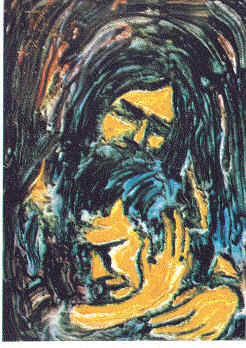

Venero la Parola di Dio, l’Icona ed il Crocifisso.
Traccio sulla mia persona il Segno della mia fede, il Segno della Croce, il Segno che mi è stato donato nel Battesimo e che mi contraddistingue come cristiano.
“Accogliendo ora la sua Croce gloriosa, quella Croce che ha percorso insieme ai giovani le strade del mondo, lasciate risuonare nel silenzio del vostro cuore questa parola consolante ed impegnativa: <Beati…>”.
[XVII GMG Toronto, Festa di accoglienza dei giovani, Discorso di Giovanni Paolo II, 25 Luglio 2002]
“Il Dio, diventato agnello, ci dice che il mondo viene salvato dal Crocifisso e non dai crocifissori. Il mondo è redento dalla pazienza di Dio e distrutto dall’impazienza degli uomini.”
[S. Messa di inizio del Ministero Petrino, Omelia di Benedetto XVI, 24 Aprile 2005]
Invoco lo Spirito Santo:
Spirito di Pentecoste,
ridestaci all'antico mandato di profeti.
Dissigilla le nostre labbra,
contratte dalle prudenze carnali.
Introduci nelle nostre vene
il rigetto per ogni compromesso.
E donaci la nausea di lusingare i detentori del potere
per trarne vantaggio.
Trattienici dalle ambiguità.
Facci la grazia del voltastomaco per i nostri peccati.
Poni il tuo marchio di origine controllata
sulle nostre testimonianze.
E facci aborrire dalle parole,
quando esse non trovano puntuale verifica nei fatti.
Spalanca i cancelletti dei nostri cenacoli.
Aiutaci a vedere i riverberi delle tue fiamme
nei processi di purificazione che avvengono
in tutti gli angoli della terra.
Aprici a fiducie ecumeniche.
E in ogni uomo di buona volontà
facci scorgere le orme del tuo passaggio.
(don Tonino Bello, Vescovo)
Veni, Sancte Spiritus
Veni, per Mariam.

Contemplo i segni della Passione che sono impressi nel Crocifisso.
“Raccolti intorno alla Croce del Signore, guardiamo a Lui…”[XVII GMG Toronto, Festa di accoglienza dei giovani, Discorso del Santo Padre, 25 Luglio 2002]
Dal vangelo secondo Matteo (Mt 5,1-12)
1 Vedendo le folle, Gesù salì sulla montagna e, messosi a sedere, gli si avvicinarono i suoi discepoli. 2 Prendendo allora la parola, li ammaestrava dicendo:
3 “Beati i poveri in spirito,
perché di essi è il regno dei cieli.
4 Beati gli afflitti,
perché saranno consolati.
5 Beati i miti,
perché erediteranno la terra.
6 Beati quelli che hanno fame e sete della giustizia,
perché saranno saziati.
7 Beati i misericordiosi,
perché troveranno misericordia.
8 Beati i puri di cuore,
perché vedranno Dio.
9 Beati gli operatori di pace,
perché saranno chiamati figli di Dio.
10 Beati i perseguitati per causa della giustizia,
perché di essi è il regno dei cieli.
11 Beati voi quando vi insulteranno, vi perseguiteranno e, mentendo, diranno ogni sorta di male contro di voi per causa mia. 12 Rallegratevi ed esultate, perché grande è la vostra ricompensa nei cieli. Così infatti hanno perseguitato i profeti prima di voi.
Parola del Signore

La Parola di Dio scritta nella Bibbia si legge con la penna e non soltanto con gli occhi!
“Lettura” vuol dire leggere il testo sottolineando in modo da far risaltare le cose importanti.
È un’operazione facilissima, che però va fatta con la penna e non soltanto pensata.
MEDITATIO Seduto, rileggo la Parola per più volte, lentamente. Anche la lettura della Parola di Dio è preghiera. Siamo entrati in quella zona più sacra e più lunga del nostro Ritiro on line: “Il Grande Silenzio”! Il protagonista è lo Spirito Santo.
Che cosa c'è di più antitetico che afflizione e gioia? Diresti che dove c'è l'uno non ci può stare l'altra, che l'uno esclude l'altra in assoluto. Se soffri, può essere patologico dire che gioisci, viceversa se gioisci non soffri.
Ma entriamo più profondamente nel senso di questa beatitudine.
Intanto, mentre la beatitudine della mitezza, della purità di cuore, della fame e sete di giustizia è qualcosa che scegliamo di avere, qui l'essere afflitti (come l'essere perseguitati) è qualcosa che ci capita addosso e ci fa del male, in genere senza che lo vogliamo. Nasce un interrogativo importante: l'afflizione è solo una negatività da subire passivamente? Oppure si può vivere come positività? Cerchiamo di approfondirlo in ordine alla nostra vita.
Beati gli afflitti
La traduzione della Bibbia interconfessionale traduce: “Beati quelli che sono nella tristezza perché Dio li consolerà". Il termine originale "epenthountes" che significa tanto afflizione che tristezza, più direttamente richiama il lutto per una persona cara scomparsa, tanto che la versione latina dice: "qui lugent" (= quelli che piangono). Di qui il poter affermare che il senso del vocabolo "afflitti" si allarga a ogni realtà che, di fatto, procura dolore, sia a livello personale che sociale.
Riusciamo ancora a penetrare il senso biblico di questa beatitudine leggendo Isaia (61, 1-3): "Lo Spirito del Signore è su di me; mi ha mandato a portare il lieto annuncio ai miseri, a fasciare le piaghe dei cuori spezzati, a proclamare la libertà agli schiavi, la scarcerazione ai prigionieri, per consolare tutti gli afflitti, per allietare gli afflitti di Sion”. Non certo a caso è ripetuto il termine "afflitti"; si rivolge a vari tipi di persone sofferenti: miseri, cuori spezzati, scarcerati, schiavi. Nel NT cogliamo questa realtà di dolore anzitutto nella persona di Gesù. Egli piange su Gerusalemme che non ha conosciuto il tempo della visita di Dio, quindi della sua pace (Lc 19,41) e scoppia in lacrime presso la tomba dell'amico Lazzaro (Gv 11,35). San Paolo confessa di sé: "Ho servito il Signore in tutta umiltà tra le lacrime e le prove che mi hanno procurato i miei avversari…" e "…Non ho cessato di esortare tra le lacrime ciascuno di voi" (At 20, 19.31). Ancora un altro senso dell'afflizione registrato nel NT: Pietro, rientrato in sé dopo il rinnegamento, detesta e piange amaramente il suo peccato (Cfr Lc 22,62). Questo dolore che è sana compunzione e che porta poi alla gioia, è anche nelle lettere di Paolo. I Corinti sono da lui severamente rimproverati; essi ne sono profondamente afflitti e si pentono del male commesso; il passo alla gioia non è lontano. L'afflizione legata al percepirsi peccatori e al fare penitenza affliggendosene è evidente in Giacomo: "Gemete sulla vostra miseria, fate lutto e piangete (…) Umiliatevi davanti al Signore ed Egli vi esalterà” (Gc 4, 8-10). Se poi diamo uno sguardo alla vita dei santi, vediamo come hanno vissuto questo tipo di afflizione a causa dei loro peccati. L'afflizione era giusta per loro. La vivevano come purificazione, per amore. L'afflizione cambia aspetto, nella misura in cui mi rapporto a Dio. Dentro uno sguardo contemplativo concepisco il mistero della mia miseria e di più, molto di più, il mistero della sua misericordia.

…perché saranno consolati ( Dio li consolerà)
Ed è proprio dal mistero del suo essere Amore e Misericordia che saremo consolati. Sant’ Agostino commenta: "Saranno consolati dallo Spirito Santo che soprattutto per questo è detto Paraclito, che significa "Consolatore". Riprendiamo il testo di Isaia: "Lo Spirito del Signore è su di me (…) per consolare tutti gli afflitti; per allietare gli afflitti di Sion, per dare loro una corona invece della cenere, olio di letizia invece dell'abito da lutto, canto di lode invece di un cuore mesto" (Is 61, 1-3). La consolazione è questa onda della vitalità e dell'amore e della purezza di gioia che è l'essere stesso di Dio. Riesce a travolgere l'onda dell'afflizione, purché ci sia l'apertura, il grido esistenziale, la coscienza che non solo è impossibile che l'afflizione diventi un bene, ma è assurdo, paranoico e masochistico reputarla come tale. Però se viene investita dall'onda viva di Dio che è il mistero del Crocifisso - Risorto, lì e solo lì si trasfigura, lì e solo lì diventa un bene, dunque una grande gioia.
Meditiamo attualizzando:
Di dolore, di afflizione è pieno il mondo. E in ogni epoca l'uomo è tentato di urlare che mai come nel suo tempo, mai prima si è tanto sofferto. Si dirà perfino che, aumentato il progresso scientifico, tecnologico e telematico sono aumentate le cause del dolore: cause più sofisticate e sottili, ma non meno perniciose e devastanti. Si pensi al mercato internazionale della droga, ecc. Certo, nessuno può mettersi al riparo dal dolore. Per il fatto di essere uomini, abbiamo sulla mensa del nostro quotidiano il pane del dolore. Alcuni accusano il Cristianesimo di aver troppo parlato di dolore, sottolineando la necessità di portare la propria croce, di essere proprio “volontari della sofferenza” perché si è cercato il dolore! Non è che nascano difficoltà nel dialogo della coppia perché sono credente, non è che la morte di una persona cara o un fallimento, una delusione mi raggiungano per il fatto che, da cristiano, "devo portare la croce" senza un minimo di speranza. Piuttosto, nella mia vicenda esistenziale che necessariamente non può eludere il dolore, il fatto di credere che "Dio tergerà ogni lacrima" (Ap 7,17), la certezza di sapere che "non ci sarà più morte né lutto né lamento né affanno perché le cose di prima sono passate" (Ap 21, 3-4) e che non c'è paragone tra la misura di dolore che è in questa vita e la dismisura di gioia dopo (cfr Rm 8,18-19)… tutto questo davvero ci consola. La consolazione, per chi credendo, chiede a Gesù di assimilare la sua sofferenza alla sua croce, non è solo una realtà escatologica, ma al Figlio di Dio che ha sofferto ed è morto. Già qui e ora infatti si può entrare nel conforto e quindi anche nella gioia di sapere che quello che soffriamo ha senso, unito ai patimenti di Gesù. Addirittura acquista valore di purificazione e salvezza per me e per gli altri: compio infatti quello che manca alla passione di Gesù, per il suo corpo: la Chiesa (cfr Col 1,24).
La Parola m’interpella
![]() Anzitutto guardo
bene in faccia le cause delle mie afflizioni. Devo avere il coraggio di cogliere
al laccio dell'evidenza, certi motivi fasulli di sofferenza che vengono da
gelosia, invidia, suscettibilità, intolleranze, esigenze dell'ego, vittimismo
nei confronti del partner, o dei figli o dei genitori. Questi motivi, chiamati
per nome, dissolveranno l'afflizione e saremo consolati da Dio nella misura
della luce di verità che ce li farà mettere da parte.
Anzitutto guardo
bene in faccia le cause delle mie afflizioni. Devo avere il coraggio di cogliere
al laccio dell'evidenza, certi motivi fasulli di sofferenza che vengono da
gelosia, invidia, suscettibilità, intolleranze, esigenze dell'ego, vittimismo
nei confronti del partner, o dei figli o dei genitori. Questi motivi, chiamati
per nome, dissolveranno l'afflizione e saremo consolati da Dio nella misura
della luce di verità che ce li farà mettere da parte.
![]() Ci sono però vere
sofferenze personali visibili e nascoste, sofferenze morali e spirituali
pungenti e profonde. Sono afflizioni, per la morte di una persona cara, per
crisi e momenti difficili riguardo l'uno o l'altro membro della famiglia, per un
avvertito rischio del degrado nel rapporto col partner o coi figli, per
difficoltà di salute o sul lavoro, ecc. Per tutto questo, più che sfogare con
tante persone i nostri guai, perché non imparare anzitutto a sfogarcene col
Signore? Nella Bibbia un libro intero è dedicato alle Lamentazioni di Geremia (cfr
per esempio Lam 3,49-57). So gridare a Dio in tutta semplicità? Voglio imparare
questo modo umile, dimesso, umanissimo di lamentarmi con Dio, lasciandomi
confortare da Lui nel silenzio.
Ci sono però vere
sofferenze personali visibili e nascoste, sofferenze morali e spirituali
pungenti e profonde. Sono afflizioni, per la morte di una persona cara, per
crisi e momenti difficili riguardo l'uno o l'altro membro della famiglia, per un
avvertito rischio del degrado nel rapporto col partner o coi figli, per
difficoltà di salute o sul lavoro, ecc. Per tutto questo, più che sfogare con
tante persone i nostri guai, perché non imparare anzitutto a sfogarcene col
Signore? Nella Bibbia un libro intero è dedicato alle Lamentazioni di Geremia (cfr
per esempio Lam 3,49-57). So gridare a Dio in tutta semplicità? Voglio imparare
questo modo umile, dimesso, umanissimo di lamentarmi con Dio, lasciandomi
confortare da Lui nel silenzio.
![]() Quando soffro per
la violenza, i soprusi, la droga dilagante, la criminalità anche dei minori,
quando mi addoloro - e giustamente - per certi mali della Chiesa che non sempre
è come dovrebbe essere, ho il coraggio di lamentarmi in preghiera con il
Signore? E rimetto poi nelle sue mani certe questioni aperte?
Quando soffro per
la violenza, i soprusi, la droga dilagante, la criminalità anche dei minori,
quando mi addoloro - e giustamente - per certi mali della Chiesa che non sempre
è come dovrebbe essere, ho il coraggio di lamentarmi in preghiera con il
Signore? E rimetto poi nelle sue mani certe questioni aperte?
![]() Nel mio soffrire
che posto ha la speranza cristiana, questa "bimbetta felice" (secondo l'immagine
del poeta Peguy) che sta in mezzo alle sue sorelle: la Fede e la Carità e le fa
correre incontro al Sole di Cristo?
Nel mio soffrire
che posto ha la speranza cristiana, questa "bimbetta felice" (secondo l'immagine
del poeta Peguy) che sta in mezzo alle sue sorelle: la Fede e la Carità e le fa
correre incontro al Sole di Cristo?

La meditazione non è fine a se stessa, ma tende a farmi entrare in dialogo con Gesù, a diventare preghiera.
ORATIO Domando umilmente di poter essere coerente con le indicazioni emerse dalla meditatio. Esprimo fede, speranza, amore. La preghiera si estende e diventa preghiera per i propri amici, per la propria comunità, per la Chiesa, per tutti gli uomini. La preghiera si può anche fare ruminando alcune frasi del brano ripetendo per più volte la frase/i che mi hanno fatto meditare.
Medito e respiro in chiave contemplativa
un importante testo della Lettera ai Romani:
"Io ritengo che le sofferenze della vita presente
non sono paragonabili alla gloria futura
che dovrà essere rivelata in noi"
(Rm 8,18).
Ripeto più e più volte queste parole,
le trasformo in dialogo fiducioso col Signore.
Contemplo poi Gesù Crocifisso, a lungo.
Mi lascio consolare dall'Amore che mi guarda dalla sua croce.

CONTEMPLATIO Avverto il bisogno di guardare solo a Gesù, di lasciarsi raggiungere dal suo mistero, di riposare in lui, di accogliere il suo amore per noi. È l’intuizione del regno di Dio dentro di me, la certezza di aver toccato Gesù.
È Gesù che ci precede, ci accompagna, ci è vicino, Gesù solo! Contempliamo in silenzio questo mistero: Dio si fa vicino ad ogni uomo!
Per Cristo, con Cristo e in Cristo
a te, Dio Padre Onnipotente,
nell’unità dello Spirito Santo,
ogni onore e gloria
per tutti i secoli dei secoli.
ACTIO Mi impegno a vivere un versetto di questo brano, quello che mi ha colpito di più nella meditatio, che ho ripetuto nell’oratio, che ho vissuto come adorazione e preghiera silenziosa nella contemplatio e adesso vivo nell’actio.
Si compie concretamente un’azione che cambia il cuore e converte la vita. Ciò che si è meditato diventa ora vita!
Prego con la Liturgia della Ore, l’ora canonica del giorno adatta al momento.
Concludo il momento di lectio recitando con calma la preghiera insegnataci da Gesù: Padre Nostro...
Arrivederci!
JJJJJJJJJJJJJJJJJJJJJJJJJJJJJJJJJJJJJJJJJJJJJJJJJJJJJJJJJJJJJJJJJJJJ
Ritiro On Line in lingua inglese
ON LINE RETREAT
JUNE 2007
I worship the Word of God, the Icon and Crucifix.
I trace the Sign of my faith, the Sign of the Cross, on myself. It is the Sign which was given to me in Baptism and distinguishes me as Christian.
“Now that we are about to welcome his glorious Cross, the Cross that has accompanied young people on the roadways of the world, let this consoling and demanding word echo in the silence of your hearts: <Blessed are they…>”.
[XVII World Youth Day in Toronto, Welcoming Ceremony to the Young People, Address of John Paul II, 25 July 2002]
“God, who became a lamb, tells us that the world is saved by the Crucified One, not by those who crucified him. The world is redeemed by the patience of God. It is destroyed by the impatience of man.”
[Mass for the beginning of the Petrine Ministry, Homily of Benedict XVI, 24 April 2005]
I invoke the Holy Spirit:
Spirit of Pentecost,
reawaken us to the ancient mandate of the prophets.
Unseal our lips,
contracted by our fleshly prudence.
Instil in our veins
the distaste for every compromise.
And give us the disgust for flattering the powerful
so that we may benefit from it.
Keep us away from ambiguities.
Give us the grace of feeling nauseated for our sins.
Place your precious mark
on our testimonies.
Make us abhor words
when they are not implemented.
Throw open the gates of our cenacles.
Help us to see the reflections of your flames
in the purifying processes
occurring in every corner of the earth.
Open us to ecumenical faith.
And make us see, in each good-willed man and woman,
the traces of your passing.
(Father Tonino Bello, Bishop)
Veni, Sancte Spiritus
Veni, per Mariam.
I contemplate the signs of the Passion which are impressed in the Crucifix.
“Gathered around the Lord's Cross, we look to Him…”
[XVII World Youth Day in Toronto, Welcoming Ceremony to the Young People, Holy Father's Address, 25 July 2002]
From the Gospel according to Matthew (Mt 5,1-12)
1 Seeing the crowds, he went onto the mountain. And when he was seated his disciples came to him. 2 Then he began to speak. This is what he taught them:
3 “How blessed are the poor in spirit,
the kingdom of Heaven is theirs.
4 Blessed are the gentle,
they shall have the earth as inheritance.
5 Blessed are those who mourn:
they shall be comforted.
6 Blessed are those who hunger and
thirst for uprightness:
they shall have their fill.
7 Blessed are the merciful:
they shall have mercy shown them.
8 Blessed are the poor in heart:
they shall see God.
9 Blessed are the peacemakers:
they shall be recognised as children of God.
10 Blessed are those who are persecuted
in the cause of uprightness:
the kingdom of Heaven is theirs.
11 Blessed are you when people abuse you and persecute you and speak all kinds of calumnity against you falsely on my account. 12 Rejoice and be glad, for your reward will be great in heaven; this is how they persecuted the prophets before you.
The Word of the Lord
The Word of God written in the Bible should be read with a pen, not just with the eyes!
“Reading” also involves underlining the text so as to highlight the important parts.
It's a very simple thing, but must be done with a pen, it should not just be thought of.
MEDITATIO While sitting, I read the Word slowly, several times. Reading the Word of God is also praying. We have entered the most sacred and longest phase of our on-line retreat: “The Great Silence”! The Holy Spirit is the protagonist.
Affliction and joy couldn't be more opposite. You would say that where there’s one, the other is not, one definitely excludes the other. If you are suffering, it may be preposterous to say that you are rejoicing; conversely, if you are rejoicing, you are not suffering.
Let us closely examine the meaning of this beatitude.
First of all, while the beatitude of gentleness, of purity in heart, of hunger and thirst for uprightness is something we choose to have, here affliction (and persecution) is something that happens to us and harms us, generally unbeknown to us. An important question arises: is affliction only something negative to be passively endured ? Or is it possible to live it in a positive sense? Let us examine it in respect of our lives.
Blessed are those who mourn
The translation of the interconfessional Bible is: “Blessed are those who are sad, they will be comforted by God". The original term "epenthountes", meaning both affliction and sadness, directly evokes the mourning for a loved person, so much so that the Latin version says: "qui lugent" (= those who cry). As a result, we can affirm that the sense of the word "afflicted" is referred to any situation which actually causes pain, both on a personal and social level.
We can get a further insight into the biblical sense of this beatitude by reading Isaiah (61, 1-3): "The Spirit of Lord Yahweh is on me. He has sent me to bring the news to the afflicted, to soothe the broken-hearted, to proclaim liberty to captives, release to those in prison., to comfort all who mourn, to place on those who mourn in Zion a diadem instead of ashes”. Here the term "afflicted" refers to various kinds of sufferers: the poor, the broken-hearted, those released from prison, slaves. In the New Testament, this painful situation is summed up in the person of Jesus. He sheds tears over Jerusalem which has not recognised the time of God's visit and, therefore, of peace (Lk 19,41) and weeps close to the tomb of his friend Lazarus (Jn 11,35). St Paul confesses: "I have served the Lord in all humility, with all the sorrows and trials that came to me through the plots of the Jews…" and "…I never slackened in counselling each one of you in tears" (Ac 20, 19.31). Here is another sense of affliction described in the New Testament: Peter, getting over after his denial of Christ, hates his sin and weeps bitterly (Cf Lk 22,62). This pain, a healthy grief which will lead to joy, is also mentioned in Paul’s letters. The Corinthians are severely rebuked by him; they feel deeply hurt about that and repent of their evil deeds; the joy is not so far away. The affliction in feeling sinners and doing penance grieving for that is evident in James: "Appreciate your wretchedness, and weep for it in misery (…) Humble yourselves before the Lord and he will lift you up” (Jm 4, 8-10). If we look at the saints’ lives, we can see how they lived out this kind of affliction caused by their sins. The affliction was right for them. Affliction takes on a new meaning inasmuch as I relate to God. Through a contemplative look, I understand the mystery of my misery and, most importantly, the mystery of His mercy.
…they will be comforted ( by God)
It is through His mysterious love and mercy that we will be comforted. St Augustine comments: "They will be comforted by the Holy Spirit, who is therefore called Paraclete, meaning "Comforter". Let us go back to Isaiah’s text: "The spirit of Lord Yahweh is on me (…) to bring the news to the afflicted; to place on those who mourn Zion a diadem instead of ashes, to give them oil of gladness in place of mourning, a glorious mantle instead of a listless spirit" (Is 61, 1-3). The comfort here lies in this wave of vitality, love, joyful purity which is God Himself. It is capable of knocking down the wave of affliction, as long as there is openness, an existential cry, the awareness that affliction cannot turn into good, it would be even absurd, paranoiac and masochistic to think this way. But if it is swept away by God’s lively wave, which is the mystery of the Crucified and Resurrected One, it is transformed: only in this way does it turn into good and, therefore, great joy.
Let us meditate the passage implementing it in today’s world:
The world is full of grief and affliction. In every age, man is tempted to cry that never before his time has there been so much suffering. There will even be some saying that the causes of pain are increased by the progress of science, technology and telematics: more sophisticated, subtle causes, but certainly not less pernicious and devastating... just think i.a. of the international drugs trafficking. Obviously, no one is spared from pain. The sheer fact of being humans involves having to face a pain daily. Some blame Christianity for dealing too much with pain, stressing the need to take up one’s cross; so we are “volunteers of sufferance” because we have sought pain! Difficulties in a couple’s dialogue cannot be put down to faith; if I am hit by the death of a loved person or a failure, a disappointment, this is not because, as a Christian, "I have to bear the cross" without nursing hopes. Rather, in our life where pain is unavoidable, believing that "God will wipe away all tears" (Rv 7,17), the awareness that "there will be no more death and no more mourning or sadness or pain. The world of the past has gone" (Rv 21, 3-4) and the sufferings of this present time are as nothing compared with the glory to be disclosed for us (cf Rm 8,18-19)… All this is really comforting for us. For those who, being believers, ask Jesus to liken their sufferance to His cross, comfort is not an eschatological reality; it is conforming to the Son of God who suffered and died. Right now, in fact, we can be comforted and rejoice in knowing that what we are suffering from has a meaning, being related to Jesus’ sufferings. It can even have a purifying, salvation value for myself and others: in fact, I make up all the hardships that still have to be undergone by Christ for the sake of His body: the Church (cf Col 1,24)
The Word challenges me
· First and foremost, I have to face up to the root causes of my afflictions. I have to have the courage to understand, through evidence, certain false reasons for suffering deriving from jealousy, envy, susceptibility, intolerance, the ego’s needs, self-pity towards our partner, children or parents. These specific reasons, once identified, will dissolve afflictions and we will be comforted by God through the light of truth which will help us push them to one side.
· There are, however, personal sufferings which are visible or hidden, as well as deep, excruciating moral and spiritual sufferings. These are afflictions caused by the death of a loved person, crises and difficult moments for a member of the family, for a perceived risk of degradation in the relationship with our partner or our children, for health or work-related problems, and so forth. For all this, instead of pouring out our troubles to many people, why not learning to confide in God about them? A whole book of the Bible is devoted to Jeremiah’s lamentations (cf for example Lam 3,49-57). Am I able to cry out to God in simple words ? I want to learn this humble, unassuming, very human way to complain to God, letting myself be comforted by Him in silence.
· When I’m sad owing to violence, abuses, the widespread drug trafficking, crime involving even people under age, when I am afflicted – rightly – by certain ills of the Church - which at times does not behave as she should - do I have the courage to complain to the Lord in my prayer? Do I refer certain open questions to Him?
· What place does Christian hope occupy in my sufferings - this “happy little girl” (from the image by poet Peguy) who is in-between her sisters, Faith and Charity, and makes them run up to Christ?
Meditation is not a practice for its own sake. It tends to make me enter into a dialogue with Jesus, to become prayer.
ORATIO I humbly pray for being consistent with the indications emerged from the meditatio. I express faith, hope, love. Prayer extends and becomes such for our friends, our community, for the Church, for all men. Prayer can also be recited by ruminating over some phrases of the passage, repeating that or those which struck me most for my meditation.
I meditate and contemplate
a significant text from the Letter to the Romans:
"In my estimation, all that we suffer in the present time
is nothing in comparison with the glory
which is destined to be disclosed for us"
(Rm 8,18).
I repeat these words several times,
I turn them into a hopeful dialogue with the Lord.
Then I contemplate Crucified Jesus, for a while.
I let myself be consoled by the Love that looks at me from His cross.
CONTEMPLATIO I feel the need to concentrate on Jesus only, to let myself be reached by His mystery, to rest on Him, to receive His love for me. It is the perception of the Kingdom of God penetrating me, it is the certainty of touching Jesus.
It's Jesus who precedes us, accompanies us, who is close to us, Jesus alone! Let's contemplate this mystery in silence: God is close to every man!
Through Him, with Him and in Him,
in the unity of the Holy Spirit,
all glory and honour is yours, Almighty Father,
forever and ever.
ACTIO I commit myself to living out a verse of this passage, the one which struck me most in my meditatio, which I repeated in my oratio, I lived as silent prayer and adoration in my contemplatio and I now live in my actio.
The action I've done changes my heart round and causes a U-turn in my life. What has been meditated becomes life now!
I pray with the Liturgy of the Hours, the canonical hour of the day suitable for the specific moment.
I conclude my lectio, reciting peacefully the prayer we have learnt from Jesus: Our Father....
Bye for now!